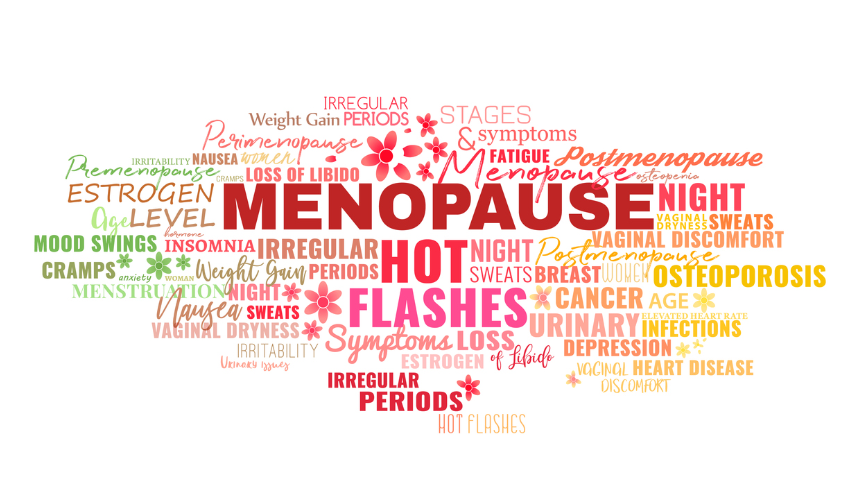The Trust is committed to being a Menopause Friendly Employer, ensuring that people feel confident in discussing menopausal symptoms openly, without embarrassment, and are able to ask for support and adjustments in order to continue to work safely in the organisation. For this reason, menopause at work is an issue for men as well as women, transgender and non-binary people.
What is Menopause?
- Helpful Definitions:
Menopause is the point at which oestrogen levels decline, and periods stop. Menopausal symptoms are typically experienced for several years so its best described as a ‘transition’ rather than a one-off event.
Perimenopause is the time leading up to menopause when they may experience changes and menopausal symptoms. This can be years before menopause.
Post menopause is the time after menopause has occurred, starting when a woman has not had a period for 12 consecutive months and for the rest of her life. When we talk about menopause in this guidance, we are referring to any of these stages.
- What are the Symptoms of Menopause?
Hormonal changes can result in a wide range of symptoms, both physical and psychological. Anyone can be affected by hormonal changes during their lives for several reasons, including pregnancy, fertility treatment, gender transitioning, conditions needing hormone treatment, and menopause. These can bring about symptoms which could affect a colleague at work.
Symptoms vary, and can include (but are not limited to):
| Hot flushes | Night sweats | Headaches |
| Depression / Low Mood | Recurrent urinary tract infections | Poor concentration |
| Anxiety | Panic attacks | Heavy periods |
| Dry eyes | Poor sleep | Weight gain |
| Fatigue | Poor memory / ‘brain fog’ | Joint stiffness, aches and muscles pains |
Managing menopause symptoms and long-term health
Managing menopause is a personal choice. Some prefer a natural approach, others a medical approach, or for some it can be a combination of the two. Benefits, risk and medical history also need to be taken into account.
Talking to your GP
- We always recommend you go to your GP if you’re experiencing menopausal symptoms. They can discuss options with you, including hormone replacement therapy (HRT), and advise on any lifestyle changes which could help. They should also be able to advise you on complementary treatments, including herbal remedies. A little preparation will help you get the best from your appointment. You could also record your symptoms and detail your menstrual cycle history.
- GPs use the NICE guidelines to help people manage their menopause – it’s a good idea to read through these too: Menopause | Information for the public | Menopause: diagnosis and management | Guidance | NICE
Menopause Hub:
- Contains helpful information, useful resources and tips around managing menopausal symptoms. See: Home | Menopause Hub – Expert information, useful resources, top tips and women’s stories (henpicked.net)
- The NHS website has some good, information about the menopause: https://www.nhs.uk/conditions/menopause/
How Can I Access Staff Support Around Symptoms of Menopause?
Talking to your Line Manager
- The Trust aims to facilitate an open, understanding working environment and so we encourage employees to inform their Line Managers that they are experiencing menopausal symptoms at an early stage to ensure that support is available. You could do this as part of a THRIVE wellbeing conversation.
- Our staff networks aim to build a sense of belonging of purpose in the workplace, providing a safe space for colleagues to come together to share experiences around menopause and gain peer support.
- For more information, contact Lorraine Dyson (Chair) on 01423 557966 or email [email protected]
Menopause Awareness e-Learning
- Available on Learning Lab or via eLearning for healthcare: Menopause Awareness – elearning for healthcare (e-lfh.org.uk)
- Informative training providing learners with an overview of ‘what the menopause is, the common symptoms associated with it, and scenarios which will help our people better understand the ways in which they can help support themselves and each other. Designed for all colleagues in the workforce. Whether you are a person transitioning through the menopause, or if you are looking for information to help you support a colleague, employee, friend or relative who is experiencing symptoms of the menopause.’
Humber & North Yorks Health and Care Partnership
- Staff at HDFT can access a range of free online training sessions from the Humber and North Yorks Health and Care Partnership around menopause awareness at work. See here for more information: Humber and North Yorkshire Health and Care Partnership – Booking by Bookwhen
- They have also produced helpful guidance for managers and colleagues around menopause:
Vivup Employee Assistance Programme
- Vivup has information on their website and app about managing symptoms of menopause
- If you are struggling with this and / or noticing an impact on your mental health and wellbeing, you can also access up to six sessions of counselling via Vivup. Call 03303 800658 or visit vivup.co.uk
